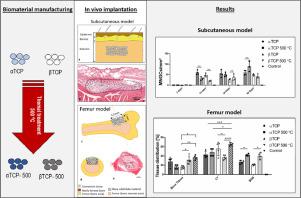Acta Biomaterialia ( IF 9.4 ) Pub Date : 2020-11-26 , DOI: 10.1016/j.actbio.2020.11.034 Sarah Al-Maawi , Mike Barbeck , Carlos Herrera -Vizcaíno , Rainer Egli , Robert Sader , Charles James Kirkpatrick , Marc Bohner , Shahram Ghanaati

|
Evaporation of phosphate species during thermal treatment (> 400 °C) of calcium phosphates leads to the formation of an alkaline layer on their surface. The aim of this study was to evaluate the hypothesis that the biological response of thermally treated calcium phosphates is modified by the presence of such an alkaline layer on their surface. For this purpose, 0.125–0.180 mm α- and β-tricalcium phosphate (TCP) granules were obtained by crushing and size classification, with some being subjected to thermal treatment at 500 °C. The four types of granules (α-TCP, β-TCP, α-TCP-500 °C, and β-TCP-500 °C) were implanted subcutaneously and orthotopically in rats. Sham operations served as control.
Subcutaneously, α-TCP and β-TCP induced significantly more multinucleated giant cells (MNGCs) than calcined granules. Most of the induced MNGCs were TRAP-negative, CD-68 positive and cathepsin K-negative, reflecting a typical indication of a reaction with a foreign body. The vessel density was significantly higher in the α-TCP and β-TCP groups than it was in the α-TCP-500 °C and β-TCP-500 °C groups. In the femur model, β-TCP-500 °C induced significantly more new bone formation than that induced by β-TCP. The granule size was also significantly larger in the β-TCP-500 °C group, making it more resistant to degradation than β-TCP. The MNGC density was higher in the α-TCP and β-TCP groups than in the α-TCP-500 °C and β-TCP-500 °C groups, including cathepsin-positive, CD-68 positive, TRAP-positive and TRAP-negative MNGCs.
In conclusion, this study confirms that the biological response of calcium phosphates was affected by the presence of an alkaline layer on their surface. Thermally-treated α-TCP and β-TCP granules produced significantly fewer MNGCs and were significantly less degraded than non-thermally-treated α-TCP and β-TCP granules. Thermally treating α-TCP and β-TCP granules shifts the reaction from a foreign body reaction towards a physiological reaction by downregulating the number of induced MNGCs and enhancing degradation resistance.
中文翻译:

体内研究表明,在500°C的热处理显着降低了对不规则磷酸三钙颗粒作为异物的反应。
在对磷酸钙进行热处理(> 400°C)时,磷酸盐物质的蒸发会导致在其表面形成碱性层。这项研究的目的是评估以下假设:热处理过的磷酸钙的生物反应因其表面上存在这样的碱性层而改变。为此,通过粉碎和粒度分类获得了0.125-0.180 mm的α-和β-磷酸三钙(TCP)颗粒,其中一些在500°C的温度下进行了热处理。将四种类型的颗粒(α-TCP,β-TCP,α-TCP-500°C和β-TCP-500°C)植入大鼠皮下和原位。假操作作为控制。
皮下,α-TCP和β-TCP诱导的多核巨细胞(MNGC)明显多于煅烧颗粒。大多数诱导的MNGC均为TRAP阴性,CD-68阳性和组织蛋白酶K阴性,反映出与异物发生反应的典型迹象。α-TCP和β-TCP组的血管密度明显高于α-TCP-500°C和β-TCP-500°C组的血管密度。在股骨模型中,β-TCP-500°C比β-TCP诱导的新骨形成明显更多。在β-TCP-500°C组中,颗粒尺寸也明显更大,使其比β-TCP更耐降解。α-TCP和β-TCP组的MNGC密度高于α-TCP-500°C和β-TCP-500°C组,包括组织蛋白酶阳性,CD-68阳性,TRAP阳性和TRAP -阴性MNGC。
总之,这项研究证实了磷酸钙的生物反应受到其表面碱性层的影响。与未热处理的α-TCP和β-TCP颗粒相比,热处理的α-TCP和β-TCP颗粒产生的MNGC明显减少,降解程度也显着降低。通过下调诱导的MNGC的数量并增强抗降解性,对α-TCP和β-TCP颗粒进行热处理可将反应从异物反应转变为生理反应。











































 京公网安备 11010802027423号
京公网安备 11010802027423号